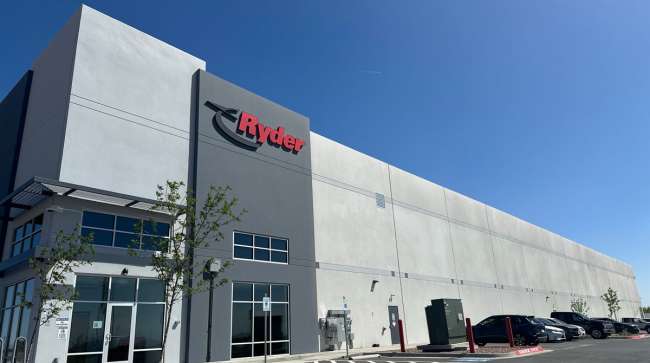Staff Reporter
Ryder Posts Q2 Profit Surge, Revenue Up 10% on Leasing Gains

[Stay on top of transportation news: Get TTNews in your inbox.]
Profits and revenues at Ryder System Inc. increased in the second quarter of 2024 on the back of higher returns from its leasing and maintenance program, the integration of the Cardinal Logistics acquisition and the absence of an accounting charge taken in the year-ago period.
Miami-based Ryder posted a $127 million profit, or $2.84 per diluted share, in Q2 after reporting an $18 million loss, minus 40 cents, a year earlier. The Q2 2023 earnings reflected a noncash $183 million U.K. business exit charge for the company’s Fleet Management Services (FMS) division.
Ryder ranks No. 6 on the Transport Topics Top 100 list of the largest for-hire carriers in North America and No. 8 on the TT Top 100 list of the largest logistics companies.
The company’s total revenue reached $3.182 billion in Q2, up 10% compared with $2.884 billion in the prior year. Still, Ryder fell short of analyst expectations of $3.24 billion.
“Ryder delivered solid second-quarter results and continued to outperform prior cycles,” said CEO Robert Sanchez. “Comparable EPS were above our forecast primarily reflecting better-than-expected ChoiceLease results. [Return on equity] of 16% demonstrated the increased resilience of our transformed business model and is in line with our expectations for the latter stage of a freight-cycle downturn.”
Ryder’s ChoiceLease leasing and maintenance program, part of the FMS division, saw a 6% year-over-year increase in its average fleet count in Q2 to 146,000 from 137,800.
FMS, which is Ryder’s biggest unit, reported total revenue of $1.478 billion in the three months that ended June 30, up 1% compared with $1.459 billion in the year-ago period. The segment also includes Ryder’s used vehicle sales and SelectCare maintenance operations.
The company sold 6,000 used vehicles in Q2, up 9% compared with 5,500 in the year-ago period. In the six months that ended June 30, Ryder sold 12,600 used vehicles, up 19% from 10,600 in the same period in 2023.
Chief Financial Officer John Diez said during the earnings call: “Used vehicle inventory increased to 9,500 vehicles at quarter end, reflecting higher lease expirations. Inventory was just above our targeted inventory range and is expected to decline as fewer rental units are expected to be[taken out of service] during the balance of the year.”
Used tractor sales prices in the most recent quarter fell 19% year-over-year, while used truck prices fell 27% compared with Q2 2023, according to Ryder.
However, Ryder’s commercial rental unit saw a 12% decrease in its average fleet size to 35,500 from 40,200 a year earlier.
“Our contractual lease, dedicated, and supply chain businesses generated higher year-over-year earnings. Higher ChoiceLease results and our maintenance cost-savings initiatives benefited FMS. Strong automotive performance benefited [Supply Chain Solutions]. In [Dedicated Transportation Solutions], integration of the Cardinal Logistics acquisition remains on track and we continue to expect to achieve planned synergies,” Sanchez said in the company’s earnings statement.
Ryder’s Supply Chain Solutions division posted a 14% increase in total revenue to $1.341 billion from $1.179 billion a year earlier.
The company’s Dedicated Transportation Solutions unit notched the biggest rise in earnings, 44%, to $635 million from $440 million in the year-ago period on the back of the Cardinal Logistics deal.
Ryder acquired Concord, N.C.-based Cardinal Logistics on Feb. 1 for an undisclosed sum. Cardinal Logistics ranked No. 51 on the for-hire TT100 and No. 63 on the logistics Top 100 in 2023, prior to the deal.
Looking forward, Sanchez is optimistic in the long term.
“We continue to see long-term growth opportunities in all three business segments, supported by secular trends that favor outsourcing decisions, large addressable markets and the value of our solutions,” he told analysts on the earnings call.
In the shorter term, however, there is greater uncertainty.
“We continue to see freight conditions that remain weak, and the timing of the cycle inflection remains uncertain,” he said on the call.
“The extended freight downturn and economic uncertainty have been causing some customers … to delay decisions or downsize their fleets,” he added. “These near-term contractual sales headwinds are consistent with where we are in the cycle and the current economic environment. We remain confident in the long-term secular growth trends for all our businesses.”
Want more news? Listen to today's daily briefing below or go here for more info:




